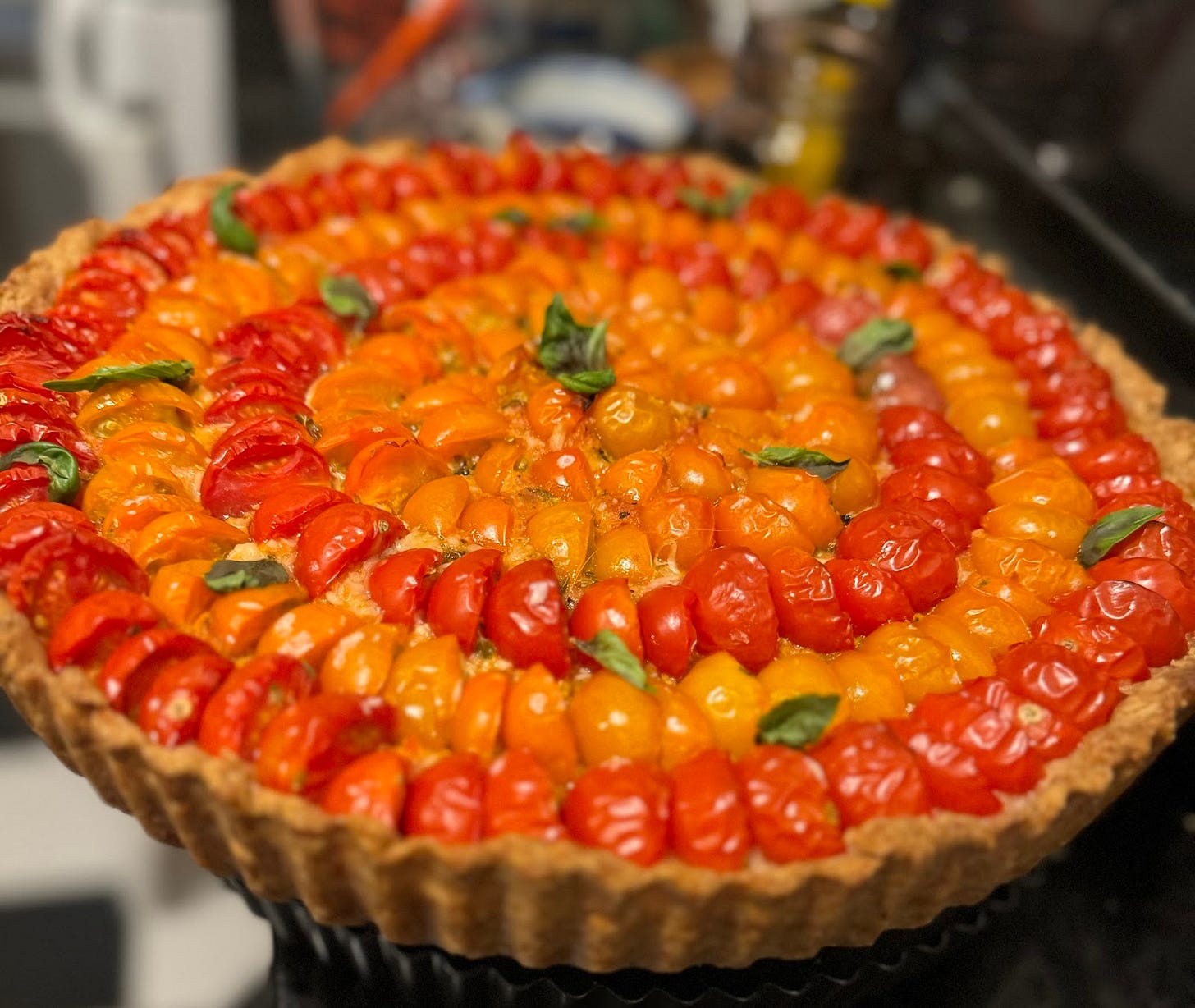Welcome to Favvulous!
Two New York City schoolmates, a doctor and a lawyer, reconnect on Facebook, about thirty years after graduation, united in loathing Trump. One knits the other a pussy hat, and they start a friendship they missed out on in high school. Continuing the thread about cooking, swimming, aging, caretaking, healthy habits, the planet, mid-life friendship, and vanquishing the far right. Mutually considering a vegan future and how we can make it all taste good.
Why just be great when you can be Favvulous?
EG: I was born in New York City and have lived here for most of my life, with stints in Asia and London. JB and I met as seventh grade classmates at a small independent school in Manhattan, where our friendship circles overlapped. I was a Princess Diana-obsessed theater geek, politics wonk, and member of the mock trial team, and JB was sportier. After graduation, I went off to study International Relations and East Asian Studies and set out for China for a year, before settling back in Manhattan for law school, embracing my nerdiness by becoming a technology lawyer (for the past thirty years), as well as a foodie, chef, writer, voting rights activist, auntie, avid traveler, and mermaid (more on that another time). And I am reveling in my moment as one of those childless cat ladies (think of me as a woke Auntie Mame).
JB: Although I spent my formative years in New York City, I have now spent the majority of my life in California. I met my husband in medical school in New Hampshire, and we did our residency training in Albuquerque, New Mexico. Both our daughters were born in the Land of Enchantment. We moved to San Francisco in 2001 for my husband to do specialty training at UCSF, and we have been here ever since. I practiced Emergency Medicine for about fifteen years, then opened a private practice focused on advanced illness and elder care. More recently, I worked for the SF Fire Department as their employee health physician. I served in that role through the worst of the pandemic, but retired in March to give myself room for my many hobbies (including year-round Bay swimming!) and to be more available to my family.
EG: Over the years, our far flung high school class has reconstituted itself on social media. The older we get, the more we appreciate the bonds of shared adolescent experience, and the curiosity and independence we developed growing up in New York City. JB and I were brought together by our mutual disdain for Trump (and, nearly a decade later, here we are again). When I graduated from high school, I spent the summer volunteering for Geraldine Ferraro, the first woman to run for Vice President. In 2016, I was in the Brooklyn Navy Yard for the celebration on the night Hillary secured the Democratic nomination for President. I knocked on doors and worked the phones for the campaign, hopeful that we would finally elect a woman to the Oval Office. The morning after Election Day, my phone woke me very early with an alert that Trump had won. I got up, vomited, and crawled back under the duvet for the rest of the day. And then I got to work.
To process my angst over the election, I started knitting pink hats for the January 2017 Women’s March. Obsessively, I made more than forty of them in two months, and one of them made its way to JB in San Francisco. JB and I are both knitters and kitchen tinkerers. It was easy for us to pick up the conversation, and we haven’t stopped talking since. So we decided to bring you into our dialogue.
JB: I love the term, “Favvulous.” Remind me of its origins.
EG: During college, I befriended a brilliant and occasionally eccentric Virginian, who was my comrade in Chinese language study, Wednesday night Dynasty viewing parties, and midnight trips to SuperFresh, the 24-hour grocery store, when we were writing our senior theses. He developed a language based on my initials (EG-bonics), taught me how to dry-age a marshmallow Peep to perfection, and schooled me in the Southern art of bestowing nicknames as a sign of endearment. This friend has a nickname for everyone, and was the most frequent occupant of the guest room in my London flat, when we were in our thirties. On one such trip, he met one of my very exuberant (and equally brilliant) friends, for whom “fabulous” was her most frequently used adjective. For reasons unknown, probably involving a martini or two, the Virginian and I started pronouncing it as “Favvulous,” and that became our loving nickname for her. To this day, whenever something is particularly wondrous or over the top, he and I gesture emphatically and declare it Favvulous. In 2014, to combat a spate of ennui, I challenged myself to find one bit of wonder every day. I referred to it on Facebook as my “Moment of Fav.” My friends loved it, especially JB.
In the spirit of Favvulous, we hope this Substack is your monthly Moment of Fav.
JB: This month we are thinking and talking about Alzheimer’s and plant-based diets and focusing on some research which may turn out to be truly Favvulous.
EG: JB and I have both been caregivers for family members with Alzheimer’s. Each path of decline was excruciating to watch. Knowing we are at higher than average risk, JB and I want to do what we can to take care of our brains.
At the beginning of the summer, Dean Ornish, a lifestyle doctor and researcher published a study on the effects of lifestyle changes on cognitive impairment and dementia. JB sent me the study and, since she is a physician, I had some questions.
EG: JB, what is the premise of the study?
JB: Ornish believes that changes in lifestyle are more powerful than pharmaceuticals to prevent heart disease, stroke and now, Alzheimer’s disease. Readers might not remember that Ornish was credited with turning Bill Clinton’s life around after Clinton’s second heart surgery in 2010.
In this study, they took two groups of people with early signs of dementia and subjected one group to rigorous dietary and exercise interventions for 20 weeks (5 months), with a focus on plant-based nutrition. The other group was on a “wait list” for the interventions, but subjects were monitored and measured for the same things: memory tests and blood tests for markers of Alzheimer’s Disease.
The researchers found a significant link between lifestyle change and degree of memory impairment. Interestingly, there was even a “dose/response” relationship, whereby participants who followed the program most closely had better results. A few people in the study group even showed improvement of memory and functioning, not just a slowing of decline! I’m not aware of any medication that has shown that.
EG: Has anyone else looked at diet and possible impact on Alzheimer’s?
JB: Ornish cites three studies in his paper, including this one, that show a link between diet and Alzheimer’s.
EG: How is the Ornish study different from prior research?
JB: This is another study that adds to a growing body of studies which employ a clinical intervention (i.e., diet modification) and then track the onset or progression of dementia in a study population. This is not the first study of its kind, but Dr. Ornish has a wide following and achieved impressive results with a small population.
Many people have recommended the following books on lifestyle interventions to prevent and reverse Alzheimer’s: Reversing Alzheimer’s by Sandison and The MIND Diet, which also has its own website. I haven’t read either of the books, so I can’t say if I think their assertions are 100% valid, but they are worth mentioning because Dean Ornish wasn’t the first doctor to look at the effect of diet and lifestyle on the development and progression of Alzheimer’s Disease.
EG: I have been dieting since I was about ten years old and have not heard of the MIND Diet. What is it?
It’s a proscribed eating plan that has elements of the well known Mediterranean Diet (based on whole grains, fresh fruit and vegetables, fish, poultry and legumes) and elements of the DASH Diet, which is a well researched nutrition plan that helps lower blood pressure. Although Ornish’s study did not specifically follow the MIND Diet, there is a lot of overlap between his study diet and the MIND Diet. Notably, researchers at Harvard reviewed the clinical literature on the MIND Diet and did not conclude that it slowed or prevented Alzheimer’s Disease, much less reverse it. That could be due to poor compliance with the diet in those studies. Ornish’s group went to great lengths to make sure participants followed the dietary guidelines.
EG: What makes this a useful study?
JB: It could be very useful to doctors and health systems, and if they are able to replicate it with a larger group.
People like you and me, who have a family history of Alzheimer’s and are moving toward age 60, should discuss their risks with their doctors, and consider taking this study as a call to action to exercise, eat a healthier diet (less refined sugar, less meat, almost no alcohol) and to seek out social connection.
EG: Ornish has been publishing research on nutrition for decades and his views have sparked criticism. How does this align with his prior research on diet and heart disease?
JB: His previous research on cardiovascular disease follows the same dietary guidelines as this study on cognitive decline. Ornish advocates for whole grains, some starchy vegetables, little to no red meat, little to no dairy, leafy vegetables, and protein primarily from soy and legumes.
EG: I am still cooking through my pandemic stockpile of dried beans, so that sounds workable. I will continue to be full of beans! I am happy to eat more grains, fruit and veg, and fish, but I love a steak or a burger or home baked treat every once in a while. Is that OK?
JB: I think it depends on what “every once in a while” means. If Dean Ornish were talking to you, he probably wouldn’t want you to have a burger more than once or twice a year. He’s also not a fan of egg yolks. Boy, you can find a lot of opinions about eggs! I suspect Dean is correct. Here is a New York Times Op Ed he wrote on the topic of red meat and eggs in 2015, at the height of the keto/paleo diet fad.
EG: What more do we need to know about diet and cognitive decline?
JB: The biggest problem with this study, besides the small number of participants, is that the interventions were too numerous and intense to replicate reliably — and it’s hard to know which intervention had the most impact. For instance, we now know you can exercise intensely for far less than thirty minutes a day to obtain the same health benefits, so I wonder if all of the interventions in the Ornish study were necessary? What if some researcher found that a trip to the moon and back cured cancer, would that be practical information for most people? I mean, maybe for Elon Musk, but not for the rest of us. The interventions that Ornish and his team applied to their study population weren’t quite a trip to the moon, but they were pretty involved.
EG: I like the thought of sending Elon to the moon. What are the takeaways?
JB: An intensive lifestyle modification may not only be able to slow progression of cognitive decline and Alzheimer’s but may actually be able to reverse it (improve memory in participants). This is more than any drug on the market can do now. It’s hard to change habits, but if you’re worried about memory loss or your risk of Alzheimer’s, think about giving up red meat, adhering to a meal plan like the MIND Diet (no cheating!), exercising with some intensity for at least 10 minutes a day, and limiting or eliminating alcohol from your life. Maintaining your social connections, and not just on social media, is important too. As for vitamin supplementation, wait until more follow up studies are done before popping all those pricey capsules.
Well EG, on that note, I’m going for a swim in the Bay!
EG: Have fun, JB!
Dearest gentle reader, my inner lawyer (and inner Lady Whistledown) reminds you to talk to your own doctor before starting a new eating or exercise plan.
I am heading to the kitchen to make my last cherry tomato tart of the season (Yann Noury’s recipe from the New York Times Magazine), which fits the bill. It is a vEGan recipe (because you can’t be a vegan without “EG”) with a whole wheat flour and olive oil crust, and is packed with bright tomatoes and herbs. I have been making it all summer for Sunday brunches and enjoying the leftovers for weekday lunches. The tart is delicious on its own, and sublime topped with a little drizzle of pesto or chili crisp.
Until next month, JB!










Great dialogue and very informative!
Loved reading this favvulous conversation and look forward to following the thread. Hoping for more food and less Trump! Made this tasty corn and tofu the other night and didn’t even notice it was vegan until after the fact.https://cooking.nytimes.com/recipes/1025856-sheet-pan-tofu-with-corn-and-chiles?smid=ck-recipe-iOS-share